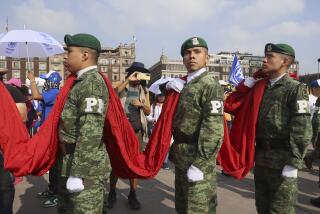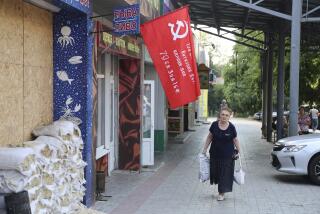Long Lines and High Hopes Greet Palestinian Municipal Elections
- Share via
JERICHO, West Bank — Salah abu Jaber had not been born yet when Palestinians last elected local leaders almost 30 years ago.
But novelty wasn’t the only reason for his excitement Thursday as the 25-year-old member of the Palestinian security forces stood in a Jericho high school waiting to mark a ballot for a 15-member local council.
The hometown election, seen as a test run for the Jan. 9 Palestinian Authority presidential vote, also represents a chance for Palestinians to show a new, democratic face to the world after the death last month of longtime leader Yasser Arafat, he said.
“We want the world to see us differently. They call us terrorists. We are not that. We want a state. We want something better for our people,” Abu Jaber said, as citizens streamed in to vote at Hisham School. “We’ll show the world that this election will be the first step to democracy.”
Jericho was among 26 towns and villages across the West Bank electing local councils Thursday, the first Palestinian municipal vote since 1976. The balloting was the first stage in staggered elections scheduled in hundreds of towns and villages throughout the West Bank and Gaza Strip during coming months.
Heavy turnout led to long waits in some places. In Jericho, officials kept polls open an extra three hours after closing time to accommodate voters.
Israel allowed Palestinian police officers to carry arms to maintain order in communities where weapons had been barred previously. Vote counting was expected to start early today, though official results were not due until Saturday.
Plans for the municipal elections were underway before Arafat’s death Nov. 11, but they have come to be viewed as a bellwether of new Palestinian efforts toward political change.
“It’s a message the Palestinian Authority is sending out to the world, saying we are committed to a democratic and electoral kind of system, and therefore listen to us and help us,” said Bernard Sabella, associate professor of sociology at Bethlehem University.
The vote marks the first time candidates affiliated with the militant group Hamas are taking part in the Palestinian electoral process, though under not under the group’s banner. Those candidates ran on Islamic slates in some places and in mixed rosters in others, such as Jericho. Hamas-linked candidates were thought to be serious contenders in a handful of towns voting Thursday. In unofficial results early today, its candidates had captured the local council in the village of Balaa in the northern West Bank, and a near- majority in Dahariya, south of Jerusalem.
The group, however, is boycotting the Jan. 9 election because it rejects the Palestinian Authority, which grew out of the 1993 Oslo accords negotiated with Israel. Hamas sat out in 1996 when Palestinians elected a president and parliament.
A new law requiring that women be represented on municipal councils resulted in a modest increase in the number of female candidates. Of nearly 900 candidates Thursday, about 140 were women. The quota means that councils, most of which have 13 members, each will have at least two women. Even conservative-minded Islamic groups fielded female candidates.
Khalda Mashaal, a 23-year-old university student voting Thursday, said she was particularly pleased by the opportunity to vote for women, though she found the quota too low.
“We should become like the Americans -- at least half and half,” she said.
Analysts and residents said clan ties were more likely to influence the outcome of the voting than party affiliations or a candidate’s stances. Voters might choose members of their extended families or candidates favored by relatives.
That could make it difficult to gauge the grass-roots clout of Hamas or Fatah, the dominant faction of the Palestine Liberation Organization.
Electioneering filled the air around Jericho. Campaign workers shuttled busloads of voters to polling places and handed out leaflets, while banners bearing candidates’ photographs fluttered above the streets.
Among the top issues here are sewage and schools. One voter complained about taxes and excessive red tape at City Hall. Another said Jericho, whose tourism industry has withered during more than four years of the armed Palestinian uprising, needed to spruce up its streets.
Although many people in Jericho voiced enthusiasm for the election, not everyone expected much to change soon.
Mursi Jubi, a 60-year-old merchant whose family has owned a store near the quaint central square since 1952, said high unemployment meant that no one had money to spend. His sales by early afternoon were barely $10.
“The main theme of this election is the change, the change,” he said. “I doubt that anything will change.”
At Hisham School, poll supervisor Amjad Jaber looked on as voters stooped over low tables to mark Xs on paper ballots.
Jaber said he attended five days of classes to learn how to run a voting station. A few hours into the balloting, he seemed pleased at how smoothly it was going. To show that the process would be tamper-proof, Jaber pointed to the ballot box, whose lock was sealed by red wax.
He insisted he would make sure all voters were treated equally. When a Palestinian general pushed his way to the front of the line, Jaber sent him back.
“We’re starting to have democracy now,” Jaber said. “This is the beginning.”
More to Read
Sign up for Essential California
The most important California stories and recommendations in your inbox every morning.
You may occasionally receive promotional content from the Los Angeles Times.













